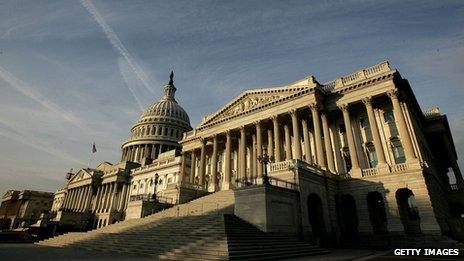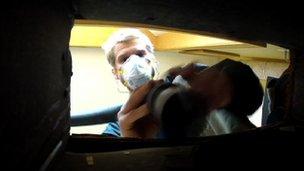Small companies chase big-dollar US federal contracts
- Published
US government contracts 'big opportunity' for small firms
Despite the high-profile financial woes of the US government, it remains one of the world's largest buyers of goods and services.
Although President Obama had to sign $85bn (£56bn) of spending cuts into effect at the start of March, the federal government still spends more than $500bn a year.
And despite the White House and Congress continuing to fail to agree on a long-term budget, the jobs are still there for contractors, many of whom are small companies, says business adviser Scott Orbach.
Mr Orbach is head of EZGSA, a consulting firm in Maryland that has helped 1,600 businesses secure US government contracts.
"Federal employees get furloughed [laid off], but the people who keep the buildings secure and the people who keep the computers running - they're still going to be there. They're needed," he says.
Streamline bidding
Army veteran Christopher Little is banking on federal authorities requiring his services. He owns a Virginia-based franchise of Duct Doctor USA, a company that specialises in cleaning air vents.
By Mr Little's reckoning, the federal government operates more than 42.5 million sq meters (140 million sq ft) of office space in the nation's capital alone, while his home state of Virginia has one of the largest concentrations of military bases in the world.
Almost all are heated and cooled through duct work, which needs regular cleaning.
Mr Little has worked for the government before, but he says securing a contract, known as a general services administration (GSA) schedule, will streamline his bidding process and give him access to more work more quickly.
The GSA is a contract that enables a business to work for any government agency for any amount of money. Approval takes between three and 12 months.

Despite the continuing financial row between the White House and Congress, federal buildings across the country still need maintenance
The contracts benefit the government because they remove the need to open every job to formal competitive bidding, so making the selection process faster.
But Mr Little says the paperwork is overwhelming, even with professional help and online tools offered by the government.
"I started actively processing and assembling information towards the GSA schedule two years ago," he says.
"The biggest challenge is time management. The demands of running a business and the demands of my family will not afford me the time to assemble and write the offer for a GSA."
'Bills are paid on time'
Mr Orbach, who is advising Mr Little, says that applying for a GSA is "something everybody's afraid of".

Christopher Little wants to win a federal contract to clean air vents
"It seems intimidatingly big. The government has its own language and rules.
"But it's pretty straightforward and, once a business gets a taste for it and a sense for it, it's just as easy - often more easy - as selling to a commercial customer."
Best of all, says Mr Orbach, the government pays its bills on time.
He also predicts that work will be secured more quickly by contract holders as the government races to fill gaps in services created by the continuing spending cuts.
"And for companies who help the government save money, there's a great opportunity. It's a really good time for consultants who offer efficiency," he says.
Companies offering security services enjoyed a decade of booming business during the wars in Iraq and Afghanistan.
Mr Orbach says those services are still in demand, but as the priorities of the administration move towards environmental issues, businesses offering green technologies and IT could step up. And he doesn't expect large cuts to training budgets.
Greater risk of litigation
Maslow Media has been producing training videos for government agencies for more than 15 years. Its chief executive Linda Maslow says her company produces 300 videos a year for government agencies that include the Department of Veterans Affairs.

Linda Maslow says it should be easier for companies to apply for government work
"Once you get into a government agency, you know, it's kind of like any other relationship, even with a commercial client. You're in," she says.
"If you do a good job, and you provide the service they want and your prices are good, which is guaranteed by the GSA schedule, yeah, you have a much longer-term relationship."
But she admits that the economic climate is causing concern.
"It's been harder and harder to obtain contracts. My focus tends to be a little more on commercial right now. But I feel that training has been one of the highest priorities in the federal government, and as long as training is funded they need training videos."
Maslow Media also enjoys an advantage over other small businesses because it's owned and operated by women. The government favours such businesses, including those owned by ethnic minority people and military veterans, or those based in special economic regions.
But Ms Maslow says government work can expose contractors to a greater risk of litigation, because a company may have unwittingly failed to comply with government regulations. A supplier may not disclose changes to where or how it sources materials. Mistakes can be uncovered years after a contract has been fulfilled.
And, Ms Maslow warns, the procurement process can be painfully slow.
"The federal government is a slow-moving boat and the people that initiate the process for getting proposals out to vendors - well, put it this way - they could use a really good training video!"